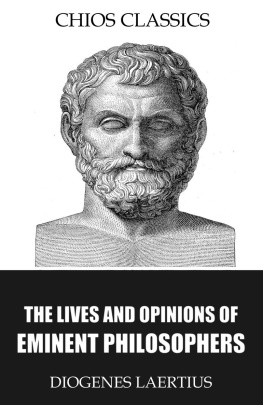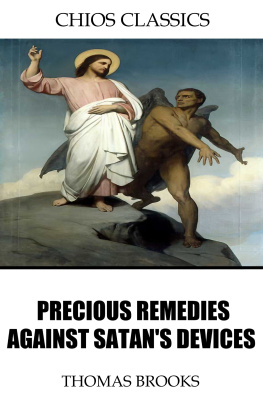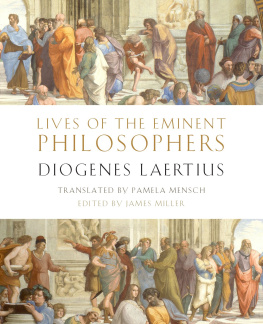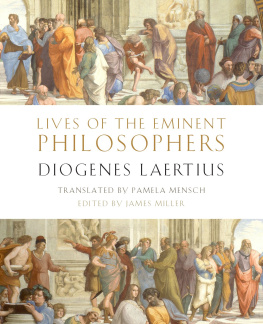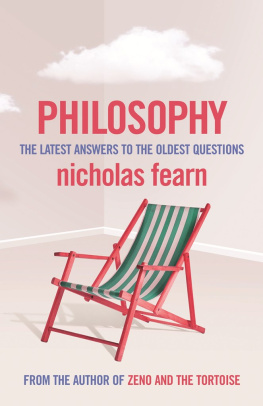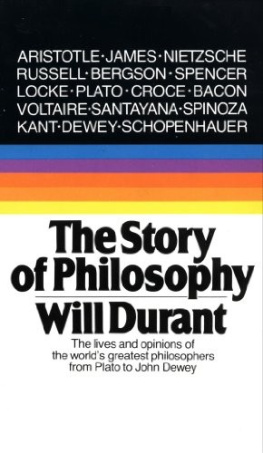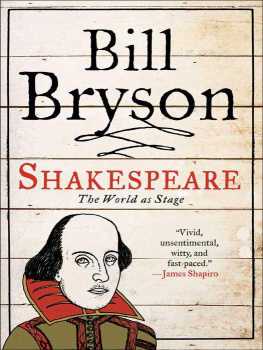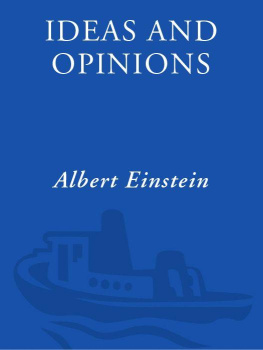Laertius - The Lives and Opinions of Eminent Philosophers
Here you can read online Laertius - The Lives and Opinions of Eminent Philosophers full text of the book (entire story) in english for free. Download pdf and epub, get meaning, cover and reviews about this ebook. publisher: PublishDrive, genre: Science. Description of the work, (preface) as well as reviews are available. Best literature library LitArk.com created for fans of good reading and offers a wide selection of genres:
Romance novel
Science fiction
Adventure
Detective
Science
History
Home and family
Prose
Art
Politics
Computer
Non-fiction
Religion
Business
Children
Humor
Choose a favorite category and find really read worthwhile books. Enjoy immersion in the world of imagination, feel the emotions of the characters or learn something new for yourself, make an fascinating discovery.
The Lives and Opinions of Eminent Philosophers: summary, description and annotation
We offer to read an annotation, description, summary or preface (depends on what the author of the book "The Lives and Opinions of Eminent Philosophers" wrote himself). If you haven't found the necessary information about the book — write in the comments, we will try to find it.
ChiosClassicsbrings literatures greatest works back to life for new generations. All our books contain a linked table of contents.
The Lives and Opinions of Eminent Philosophers is a classic collection of biographies written during the 3rd century A.D.
Laertius: author's other books
Who wrote The Lives and Opinions of Eminent Philosophers? Find out the surname, the name of the author of the book and a list of all author's works by series.
The Lives and Opinions of Eminent Philosophers — read online for free the complete book (whole text) full work
Below is the text of the book, divided by pages. System saving the place of the last page read, allows you to conveniently read the book "The Lives and Opinions of Eminent Philosophers" online for free, without having to search again every time where you left off. Put a bookmark, and you can go to the page where you finished reading at any time.
Font size:
Interval:
Bookmark:
The Lives and Opinions of Eminent Philosophers
By: Diogenes Laertius
Translated by C.D. Yonge
I. SOME SAY THAT THE study of philosophy originated with the barbarians. In that among the Persians there existed the Magi,1 and among the Babylonians or Assyrians the Chaldaei,2 among the Indians the Gymnosophistae,3 and among the Celts and Gauls men who were called Druids4 and Semnothei, as Aristotle relates in his book on Magic, and Sotion in the twenty-third book of his Succession of Philosophers. Besides those men there were the Phoenician Ochus, the Thracian Zamolxis,5 and the Libyan Atlas. For the Egyptians say that Vulcan was the son of Nilus*, and that he was the author of philosophy, in which those who were especially eminent were called his priests and prophets.
II. From his age to that of Alexander, king of the Macedonians, were forty-eight thousand eight hundred and sixty-three years, and during this time there were three hundred and seventy-three eclipses of the sun, and eight hundred and thirty-two eclipses of the moon.
Again, from the time of the Magi, the first of whom was Zoroaster the Persian, to that of the fall of Troy, Hermodorus the Platonic philosopher, in his treatise on Mathematics, calculates that fifteen thousand years elapsed. But Xanthus the Lydian says that the passage of the Hellespont by Xerxes took place six thousand years after the time of Zoroaster,6 and that after him there was a regular succession of Magi under the names of Ostanes and Astrampsychos and Gobryas and Pazatas, until the destruction of the Persian empire by Alexander.
III. But those who say this, ignorantly impute to the barbarians the merits of the Greeks, from whom not only all philosophy, but even the whole human race in reality originated. For Musaeus was born among the Athenians, and Linus among the Thebans; and they say that the former, who was the son of Eumolpus, was the first person who taught the system of the genealogy of the gods, and who invented the spheres; and that he taught that all things originated in one thing, and when dissolved returned to that same thing; and that he died at Phalerum, and that this epitaph was inscribed on his tomb:
Phalerums soil beneath this tomb contains
Musaeus dead, Eumolpus darling son.
And it is from the father of Musaeus that the family called Eumolpidae among the Athenians derive their name. They say too that Linus was the son of Mercury and the Muse Urania; and that he invented a system of Cosmogony, and of the motions of the sun and moon, and of the generation of animals and fruits; and the following is the beginning of his poem,
There was a time when all the present world
Uprose at once.
From which Anaxagoras derived his theory, when he said that all things had been produced at the same time, and that then intellect had come and arranged them all in order.
They say, moreover, that Linus died in Euboea, having been shot with an arrow by Apollo, and that this epitaph was set over him:
The Theban Linus sleeps beneath this ground,
Uranias son with fairest garlands crownd.
IV. And thus did philosophy arise among the Greeks, and indeed its very name shows that it has no connection with the barbarians. But those who attribute its origin to them, introduce Orpheus the Thracian, and say that he was a philosopher, and the most ancient one of all. But if one ought to call a man who has said such things about the gods as he has said, a philosopher, I do not know what name one ought to give to him who has not scrupled to attribute all sorts of human feelings to the gods, and even such discreditable actions as are but rarely spoken of among men; and tradition relates that he was murdered by women;7 but there is an inscription at Dium in Macedonia, saying that he was killed by lightning, and it runs thus:
Here the bard buried by the Muses lies,
The Thracian Orpheus of the golden lyre;
Whom mighty Jove, the Sovereign of the skies,
Removed from earth by his dread lightnings fire.
V. But they who say that philosophy had its rise among the barbarians, give also an account of the different systems prevailing among the various tribes. And they say that the Gymnosophists and the Druids philosophize, delivering their apophthegmns in enigmatical language, bidding men worship the gods and do no evil, and practise manly virtue.
VI. Accordingly Clitarchus, in his twelfth book, says that the Gymnosophists despise death, and that the Chaldaeans study astronomy and the science of soothsayingthat the Magi occupy themselves about the service to be paid to the gods, and about sacrifices and prayers, as if they were the only people to whom the deities listen: and that they deliver accounts of the existence and generation of the gods, saying that they are fire, and earth, and water; and they condemn the use of images, and above all things do they condemn those who say that the gods are male and female; they speak much of justice, and think it impious to destroy the bodies of the dead by fire; they allow men to marry their mothers or their daughters, as Sotion tells us in his twenty-third book; they study the arts of soothsaying and divination, and assert that the gods reveal their will to them by those sciences. They teach also that the air is full of phantoms, which, by emanation and a sort of evaporation, glide into the sight of those who have a clear perception; they forbid any extravagance of ornament, and the use of gold; their garments are white, their beds are made of leaves, and vegetables are their food, with cheese and coarse bread; they use a rush for a staff, the top of which they run into the cheese, and so taking up a piece of it they eat it. Of all kinds of magical divination they are ignorant, as Aristotle asserts in his book on Magic, and Dinon in the fifth book of his Histories. And this writer says, that the name of Zoroaster being interpreted means, a sacrifice to the stars; and Hermodorus makes the same statement. But Aristotle, in the first book of his Treatise on Philosophy, says, that the Magi are more ancient than the Egyptians; and that according to them there are two principles, a good demon and an evil demon, and that the name of the one is Jupiter or Oromasdes, and that of the other Pluto or Arimanius. And Hermippus gives the same account in the first book of his History of the Magi; and so does Eudoxus in his Period; and so does Theopompus in the eighth book of his History of the Affairs of Philip; and this last writer tells us also, that according to the Magi men will have a resurrection and be immortal, and that what exists now will exist hereafter under its own present name; and Eudemus of Rhodes coincides in this statement. But Hecataeus says, that according to their doctrines the gods also are beings who have been born. But Clearchus the Solensian, in his Treatise on Education says, that the Gymnosophists are descendants of the Magi; and some say that the Jews also are derived from them. Moreover, those who have written on the subject of the Magi condemn Herodotus; for they say that Xerxes would never have shot arrows against the sun, or have put fetters on the sea, as both sun and sea have been handed down by the Magi as gods, but that it was quite consistent for Xerxes to destroy the images of the gods.
VII. The following is the account that authors give of the philosophy of the Egyptians, as bearing on the gods and on justice. They say that the first principle is matter; then that the four elements were formed out of matter and divided, and that some animals were created, and that the sun and moon are gods, of whom the former is called Osiris and the latter Isis, and they are symbolised under the names of beetles and dragons, and hawks, and other animals, as Manetho tells us in his abridged account of Natural Philosophy, and Hecataeus confirms the statement in the first book of his History of the Philosophy of the Egyptians. They also make images of the gods, and assign them temples because they do not know the form of God. They consider that the world had a beginning and will have an end, and that it is a sphere; they think that the stars are fire, and that it is by a combination of them that the things on earth are generated; that the moon is eclipsed when it falls into the shadow of the earth; that the soul is eternal and migratory; that rain is caused by the changes of the atmosphere; and they enter into other speculations on points of natural history, as Hecataeus and Aristagoras inform us.
Font size:
Interval:
Bookmark:
Similar books «The Lives and Opinions of Eminent Philosophers»
Look at similar books to The Lives and Opinions of Eminent Philosophers. We have selected literature similar in name and meaning in the hope of providing readers with more options to find new, interesting, not yet read works.
Discussion, reviews of the book The Lives and Opinions of Eminent Philosophers and just readers' own opinions. Leave your comments, write what you think about the work, its meaning or the main characters. Specify what exactly you liked and what you didn't like, and why you think so.

